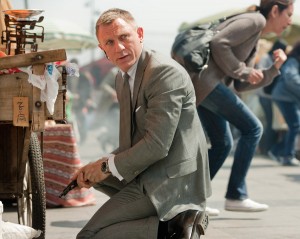Prolonged series should focus on creativity, not profit
Twenty-three films, six faces and countless martinis (shaken not stirred) to its name: James Bond stands, without a doubt, the most iconic film legacy of our time.

Back Attack· Daniel Craig returns as James Bond in Skyfall. The film, receiving rave reviews, makes a convincing case for the endless franchise. – | Photo by Francois Duhamel, courtesy of Sony Pictures Publicity
The series has crossed generations, spanning a whopping 50 years. But it wasn’t always the cultural staple that it is today. A good film series needs time to build a reputation.
The films were originally inspired by the spy-mystery book series by Ian Fleming. And like most film franchises, James Bond began as a single film: 1962’s Dr. No, starring Sean Connery and directed by Terence Young. The film has proven to be tremendously successful — it has scored a 98 percent critical average on Rotten Tomatoes and was wildly successful at the box office — and launched a series, with 22 following films.
Since Connery, actors George Lazenby, Roger Moore, Timothy Dalton, Pierce Brosnan and most recently Daniel Craig have all given 007 a whirl.
Today, so many film franchises are dragged out past their due. Hollywood just can’t seem to leave a series alone, even if it has nothing left to offer, because they know a series is bankable on the merit of its name.
Over summer, we saw a fourth installation of the Bourne series. Following The Lord of the Rings trilogy, The Hobbit hits theaters this December, with two more films to follow. The fifth, yes fifth, installation of Die Hard — A Good Day to Die Hard — comes out in February. Most recently, Disney bought out Lucasfilm, a deal in which George Lucas himself announced that he could make Star Wars films for the next 100 years — 100 years, really?
And, of course, Daniel Craig recently signed on for another two Bond films.
Clearly, Hollywood has a habit of dragging series out, squeezing every last bit of profit out of them.
From the industry perspective, it’s easy and smart to capitalize on something that’s a proven financial and cultural success. Films are huge investments that are risky enough as is. Filmmakers and studios invest millions into films that won’t prove their worth until completion.
From the viewers’ perspectives, however, it’s safe to say that many moviegoers would strongly prefer to see a new franchise rather than a tired one any day.
Studios need to realize there’s something to be said for a series that quits while it’s ahead. Why let it all go downhill?
But, then again, how are we to know when a film has nothing left to offer?
There’s no sure-fire indication of how much is too much, but it’s safe to say that a series should not continue unless there’s a story worth telling, one that will advance the series and engage audiences — think the Harry Potter and The Lord of the Rings series. It would be easy to say that James Bond has gone on too long — we’re talking 23 films here — but that’s not the case. In fact, it’s thriving more than ever.
The series has gone through a roller coaster ride. Some films have fared far better than others — Dr. No was a hit, and Octopussy a miss — but the series is constantly evolving. It changes its face, style and tone nearly every time it gets revamped.
In Craig’s turn as 007, the films have gone from great with Casino Royale to so-so with Quantum of Solace, and now — with Skyfall’s release on the horizon — the James Bond franchise appears to be on the upswing yet again.
Skyfall is being lauded by critics as one of the best Bond films yet.
“[Skyfall] conveys the melancholy of loss, mortality, and future-shock anxiety, while at the same time leaving us plenty of space to enjoy one of the most complexly unhinged villains in Bond history,” wrote Lisa Schwarzbaum of Entertainment Weekly.
James Adams of The Globe and Mail puts it more bluntly.
“Suffice to say, Skyfall is one of the best Bonds in the 50-year history of moviedom’s most successful franchise,” Adams said.
And Joe Neumaier of the New York Daily News believes the series to be as good as ever.
“Though a notch below Royale, Skyfall follows that reboot’s lead, making a now 50-year-old icon as cool as when he began,” Neumaier said.
If the critics serve as any indication, this doesn’t sound like a tired franchise.
If we had pushed James Bond out when it delivered earlier flops, we wouldn’t have seen the greats we have now.
It isn’t as simple to say that once a film falters, there’s no creative juice left. Sometimes, a series needs time to evolve. Creative teams need time to develop. Actors need to find their footing.
Continuing a series is acceptable provided there’s at least a good idea behind it. With James Bond, there have been plenty of good ideas throughout the series history, and because of its record as a mostly successful and incredibly iconic franchise, it’s one that’s worth continuing.
Does this mean all film franchises should continue in case a new, good idea could evolve? Please, God, no. If that were the case, we would easily be on Transformers 13, or worse.
James Bond is more than a series; it’s a legacy and we can at the very least afford it two more films to see where Bond takes us next. Who knows, the filmmakers might have more tricks up their sleeves, and I don’t think anyone can really object to a little more Craig.
C. Molly Smith is a junior majoring in communication. Her column “Keepin’ it Reel” runs Wednesdays.
